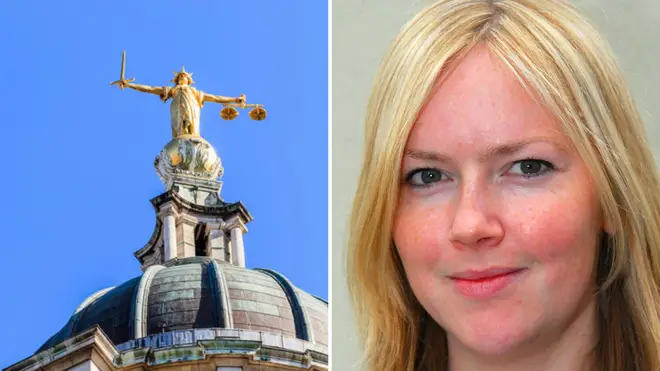
Vanessa Feltz 3pm - 6pm
22 September 2023, 08:55

Excluding journalists from rape trials could damage public confidence and discourage other victims from coming forward, according to a group of specialist reporters.
A consultation is underway over potential changes to the criminal justice system, which aim to give victims a greater sense of confidence when providing statements in court.
But it’s been warned that a move to limit the number of people present during trials - including allowing only one journalist to record proceedings - could have the opposite effect.
Rebecca Camber, crime and security editor at the Daily Mail and chair of the Crime Reporters’ Association (CRA) said: "This proposal runs the risk that reporting would be skewed and materially imbalanced, with the likely consequence being disastrous for the criminal justice system as it seeks to boost sexual offence prosecutions.
"It could have the effect of placing a veil of secrecy on sexual offence prosecutions at a time when confidence in police and the criminal justice system is at a record low."

Lawyer says rape is a 'free crime' in Britain
Speaking to Nick Ferrari on LBC on Friday, she added: "The inevitable result of restricting the public and the media only to one representative means that these cases will go unreported thereby damaging public confidence, discouraging other victims from coming forward and emboldening perpetrators."
Among the proposals made by the Law Commission is a switch to allow victims, as standard, to have a supporter with them while they give evidence, to have legal representatives remove their wigs and gowns and to exclude the public and members of the press - except for one representative - during the session.
But the consultation also suggests the public and reporters could be excluded from entire rape trials as well as the verdict and sentencing hearing - including when victim impact statements are shared - if victims ask for that to happen.
Charlotte, who reported her ex-partner to police for rape and gave evidence in a trial earlier this year, told LBC: "A lot of the time, journalists are the only people that listen to us.
"If we know that even they won’t be able to listen and hear what’s being said - the only person who may put the truth out there - then knowing the system is so against you, why would people want to come forward?

Tolerance of sexual assault has seeped ‘deep into our bones’ asserts Shelagh Fogarty
"I never even thought about reporters being in the room when I was giving evidence. I think it would’ve been great if people heard what I had to say because a lot of the things that happened behind those closed doors should be known.
"I think the opposite needs to happen - the court should be an open justice system. We need everyone to be able to be held accountable so the truth can actually come out. Closing the system won’t do anything but harm victims."
But some victims’ rights organisations have expressed their support of limiting the number of people in courtrooms while evidence is being shared.
Katie Kempen, former Victims’ Commissioner and now chief executive of Victim Support said: “It’s really important that there isn’t a culture of secrets where sexual violence cases are hidden from the public by excluding journalists from the court room.
"However [we] also know from the victim-survivors who we support that media coverage can be extremely harmful, despite them being guaranteed anonymity."
Victims of sexual offences are given a right to lifelong anonymity and often give evidence behind a screen or remotely, through video link.
Others have the option to pre-record their evidence, in a move introduced by the government to give victims greater control over how their experiences are shared.
They also have the right to ask for members of the public to be excluded when they give statements and are cross-examined, which the judge considers on a case-by-case basis.
The Law Commission is now proposing an automatic entitlement to that, as they seek to make the system fairer for victims.
A spokesperson said: "The Law Commission wants to improve how complainants are treated; make sure that defendants get a fair trial; and improve knowledge of consent and sexual harm.
"We appreciate the critical role the media play in reporting on sexual offences trials, and making sure that justice is done and seen to be done.
"Complainants can already request to give evidence in private. We are consulting on making this easier for complainants and it will always be their choice whether to request. But this would continue to include an important exemption to allow the media to report the story."
Labour revealed earlier this year that some 70% of rape victims dropped out of the justice system in the last three months of 2022.
While a change in approach was announced by ministers in terms of how police investigate rape and other sexual offences - putting more of a focus on perpetrators, rather than victims.
Announcing the national rollout of Operation Soteria, Home Secretary Suella Braverman said: "As a society, too often we have failed the victims of sexual violence.
"I have been clear that we must transform the way these investigations are handled, to make sure that all victims have the best support possible throughout the entire process. This is a vital step in delivering on that promise.
"It will help ensure investigations focus on the suspect, and never on seeking to undermine the account of the victim, as well as placing the utmost importance on their rights and needs."
The Law Commission says it welcomes all views on its proposals and once final recommendations are produced, it will be for the government to decide how to proceed.
The deadline for responses to the public consultation is September 29.